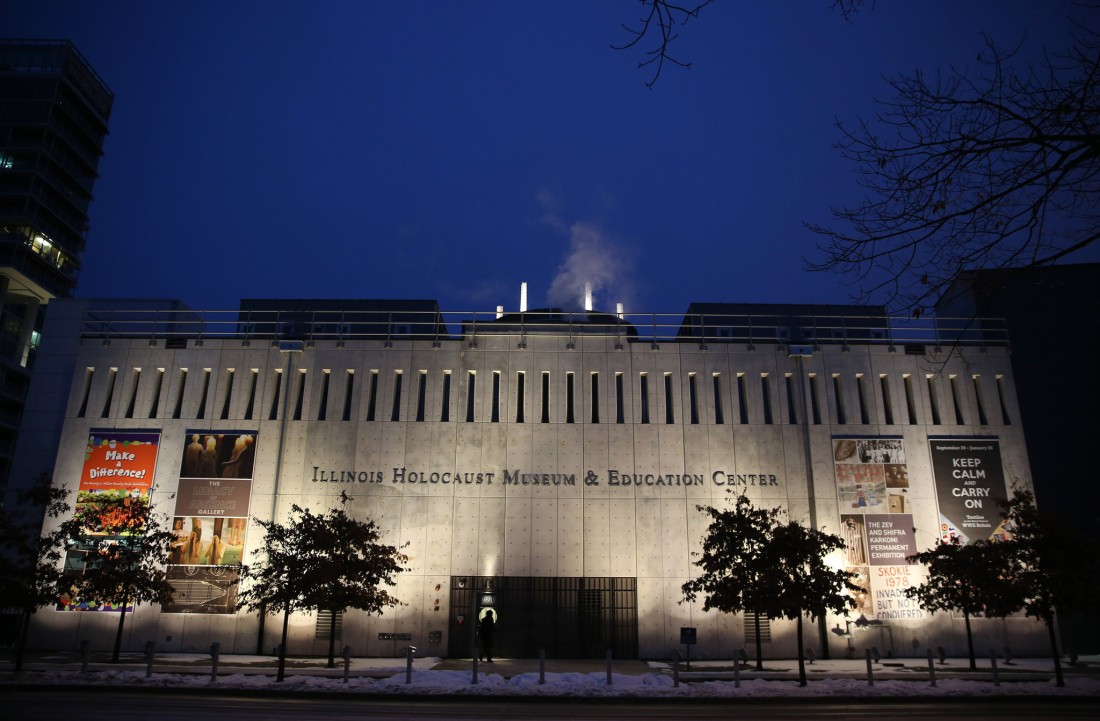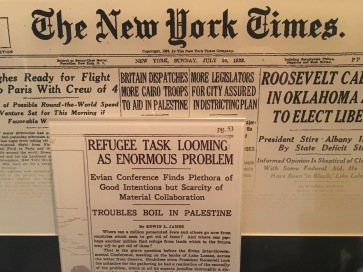Texts: Micah 6:1-8 + Psalm 15 + 1 Corinthians 1:18-31 + Matthew 5:1-12
Friday was International Holocaust Remembrance Day. The date, January 27th, is tied to the date in 1945 on which the Auschwitz-Birkenau concentration camp where 1.1 million Jews and other “undesirables” were killed was liberated by the Russians. To mark the day, I took my first trip to the Illinois Holocaust Museum & Education Center in Skokie. The museum is laid out in such a way that visitors essentially walk a timeline, viewing artifacts, reading placards and watching short movies describing how an entire nation was swept by anti-democratic forces that ultimately invested total power in a racist dictator who then presided over the largest genocide our world has ever known.

On this particular day, at this specific day in history, it was impossible not to notice the moments along that timeline when foreign nations had the power to rescue those Jews and other refugees of war fleeing for their lives, but chose not to.  The United States and other nations built “paper walls” along our borders, burying immigrants in policies and procedures that made it nearly impossible to enter the country legally.
The United States and other nations built “paper walls” along our borders, burying immigrants in policies and procedures that made it nearly impossible to enter the country legally.
I suspect many of you have seen the shameful bit of American history that’s resurfaced on the internet this past week: the saga of the German ocean liner named the MS St. Louis which crossed the Atlantic in 1939 carrying over 900 Jewish refugees from Germany in the hopes of resettling them in Americas. The ship was denied entry into Cuba, the United States, and Canada and was forced to return to Europe where a quarter of its passengers later died in Nazi death camps.
After the war, even after we’d learned the full extent of what had taken place, still America was reluctant to welcome the survivors of the holocaust upon our shores.
Libby A’Hearn Gilmore, a beloved former member of St. Luke’s and 8th-grade teacher who also took her students to the Holocaust museum this past week shared the following on Facebook:
Americans knew that the Nazis were persecuting the Jewish people and yet they stood idly by. We were prejudiced and so concerned with our own economic well-being that we did not want to intervene or welcome Jewish refugees. Now, decades later, most Americans look back at this inaction with shame and regret … Americans look back at the tragedy of the Holocaust and think, “I wish we would have prevented this tragedy.” How will future generations judge our response to the Syrian refugee crisis? We must continue to welcome Syrian refugees and increase our quotas.
Within days of her post, our new president signed executive orders that indefinitely bar Syrian refugees from entering the United States and effectively block entry by citizens from predominantly Muslim nations.
Racism and religion are as old and inseparable as scripture itself. Our holy book contains in both testaments accounts of God’s people purposefully self-segregating and violently resisting calls for transformation and renewal. Over and over again we choose to ignore and deny what God is dying to show us about the unity of creation and our common inheritance that defies all attempts to be confined to any particular race, class, or nation. We continually choose the lesser gods of ethnic pride, upward mobility, and nationalism.
“But God chose what is foolish in the world to shame the wise; God chose what is weak in the world to shame the strong; God chose what is low and despised in the world, things that are not, to reduce to nothing things that are, so that no one might boast in the presence of God.” (1 Cor. 1:27-29)
Lest we miss the point: God chose, God chose, God chose. Paul’s letter to the church in Corinth stands as a rebuttal to marketplace spirituality, relativized religion, choose-your-own deity, “we’ll just have to agree to disagree” rhetoric. God takes sides and, depending on where we’ve chosen to place our bodies or stockpile our wealth, it may not be our side.
It is certainly not the side of complacency in the presence of suffering, or conspicuous consumption in the presence of poverty. It is not the side of passivity in the face of violence and oppression, or ambivalence in the moment of crisis. God takes the side of the poor, the mourners, the meek, those who crave righteousness, who show mercy, who model purity, who make peace, whose commitment to God’s reign leads to persecution and slander.
When Jesus pronounced God’s blessing upon the poor, the mourners, the meek and all the rest, he was not echoing the conventional wisdom of the day. He was taking sides with those the Empire called “losers.” He was casting his lot with the world’s undesirables. He was planting the seed that, once planted in the earth, would grow to become the nation of Denmark sheltering Jewish refugees and white college students on integrated buses bombed by the Klan. Power and privilege emptying itself for the sake of “what is low and despised in the world.”
So today, as we gather to receive God’s blessings at font and table, we must remember all those others whom God is blessing this day. We must hear the Beatitudes as Jesus might speak them if he were delivering the sermon at this moment in time, in this place, under this Empire:
Blessed are the migrants, for their citizenship is in heaven.
Blessed are the refugees and asylum seekers, for they shall find safety.
Blessed are those whose family members died trying to get here, for they shall be consoled.
Blessed are those who march, who make calls, who write, who organize, who never give up, for they shall be able to live with themselves.
Blessed are the Muslims. Blessed are the Syrians and the Iranians, the Iraqis and the Libyans, the Somalis and the Sudanese and the Yemenis, for they shall be called children of God.
Blessed are you when people call you dreamers or idealists, when they call you soft or stupid when they attack you in public or fall silent over dinner.
Rejoice and be glad, for you are standing in the lineage of the long line of God’s prophets who have remembered in every age that we are one, and we are God’s, so we belong to each other and are called to be a blessing upon the Earth.
Amen.